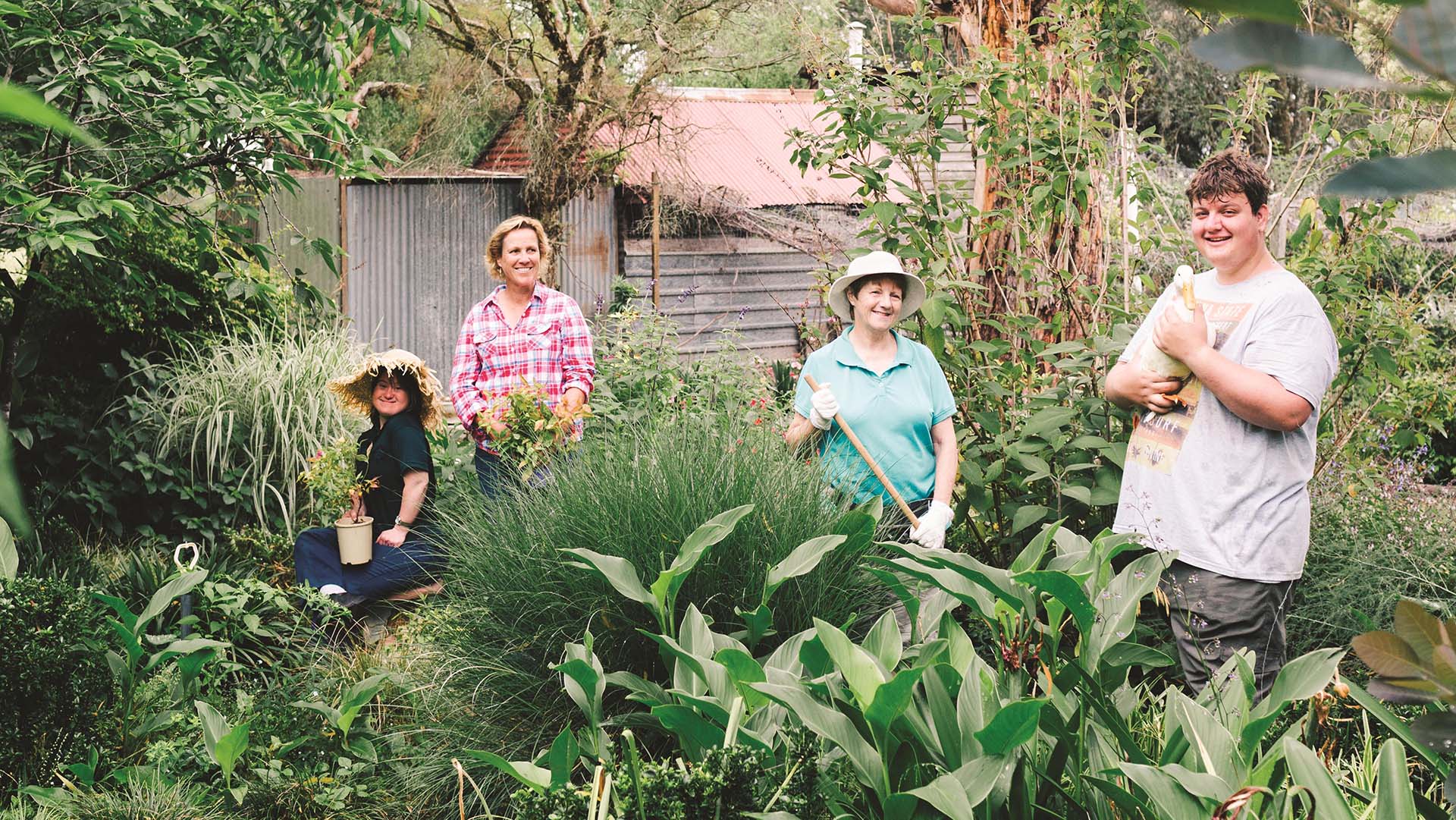"In the paddocks, ducks, guinea pigs and two goats named Cosmo and Marcia roam happily."
“When you think of a community garden you often imagine vegie plots, but there’s much more going on here,” says Marianne Farrar of the Secret Garden in Richmond, New South Wales.
And while it’s true that Australia’s community gardens – of which there are at least 750 registered with Community Gardens Australia – can range in size and scale from a few planter boxes on the footpath to sprawling city farms across multiple sites, the Secret Garden falls firmly into the category of a garden with plenty more going on.
Picture this: pebble-covered trails, meandering walkways and miniature tracks weaving under big shady pecan trees. Flowering shrubs and bird-attracting salvias. An orchard laden with tangerines, lemons and grapefruit, and a rose garden full of bright blooms. Raised mudbrick vegie plots. Garden signs, all hand painted.
Classes and workshops are often underway, carried out in the mate’s shed, nursery, and café.
In the paddocks, ducks, guinea pigs and two goats named Cosmo and Marcia roam happily. There’s even a bee hotel.
“When we moved to this site, it was just an empty paddock with a couple of stables,” says Secret Garden coordinator Kerry Carne. “It’s taken a lot of landscaping, planting, paving and mudbrick making to make it what it is today.”
Set on a 15 acre plot attached to the University of Western Sydney, just an hour’s drive from the Sydney CBD, the Secret Garden has always supported disadvantaged people in the Hawkesbury community. The site was founded 30 years ago to provide job opportunities for the long-term unemployed and those on Work for the Dole programs.
Today, the space is run by North West Disability Services (NWDS). Its mission? To teach, train and enrich the lives of people living with disabilities.
Making room for personal growth
Kerry coordinates the NWDS programs at the Secret Garden, of which there are many for participants to get involved with.
“The main programs we offer here are our garden skills and nursery sales programs,” says Kerry. “Participants will come and learn how to pot up plants, how to take care of trees and shrubs, how to serve customers – things like that. And all the proceeds from the nursery go back into the garden.”
“Participants gain the satisfaction of growing plants from seed, harvesting vegetables, picking flowers and having a good conversation and laugh with each other,” adds horticultural therapist Karen Gray.
As a horticultural therapist, it’s Karen role to match activities with Secret Garden volunteers. Horticultural therapy integrates gardens, plants or nature-based activity in health care programs.
There’s also a candle making program, the mates’ shed, a café for retail training, a recycling project and a tiny homes initiative. Participants can also partake in specialised engagement opportunities in permaculture, sustainability, animal husbandry and mud-brick making.
“We also work in conjunction Riding for the Disabled, who are on our site as well. They run riding programs for adults with a disability,” says Kerry. “There’s so much here for people to choose from. All the programs are very popular.”
People with disabilities can attend the programs either by a referral through NWDS, at which point they’ll be provided with staff support, or they can join as an external participant with their own staff support, and engage in programs that way.
All programs are open to the public, too.
"It is so important to have peaceful, beautiful places like this."

Like what you're reading?
The latest edition of Live Better magazine explores the rules and perceptions that are holding us back: from sport, to heart health and the rise of the sober curious movement.
Many hands make light work
The garden thrives thanks to the hard work of a committed group of volunteers – made up of people with varying abilities and locals from the Hawkesbury community. Each week, more than a dozen groups, schools and individuals visit to tend their plots, hang with the animals, or just spend time outdoors. Locals and families also come to shop at the nursery and picnic on the grounds. All are welcome.
“There’s a great group of people here and it’s just good to be outside,” says David, a volunteer from the local area. “My wife worked in schools for a long time as a teacher’s aide with disabled kids, so this was a natural progression for us, something we decided to do together.”
David says his connection with the other volunteers and program participants is what keeps him coming back.
“We all work as hard as we want, but always stop and chat,” he says. “It’s great to work with the disabled people who come in. You get a lot of satisfaction seeing the other volunteers grow.”
Something special
It takes just a few minutes to witness the Secret Garden’s positive impact. Kerry says it’s hard to explain just how special the space feels.
“I have a lot of people who come out of their office and come to the garden and say, ‘Wow, I’d love to work here!’” she says. “It’s the tranquillity, maybe, or it’s the people who are happy to be there and make it a beautiful place for everyone. Just walking through the maze, or going and seeing the chickens, it’s very therapeutic.”
Marianne agrees.
“So many people come from the community with diverse needs that are met by this garden,” she says. “It might be a retiree volunteering to help others, someone in a wheelchair gardening in the raised beds, a person suffering from depression enjoying the sunshine, or a young family running around after the ducks and chickens. It is so important to have peaceful, beautiful places like this.”
Find out more about the Secret Garden at secretgarden.org.au
Visit communitygarden.org.au to find a community garden near you.
How to start your own community garden
Finding land
Aside from a community, land is the vital ingredient in any new garden. But where to look? A good place to start is by asking your local council if they’re willing to free up some land for a garden. You could also look for an unused property, find out who owns it, and contact them about access. Local institutions, such as health or community centres, schools or universities can be useful starting points, too.
Stating your case
Many councils support community gardens and will have a process for getting started. When councils don’t have a policy, a well-researched and articulate submission can help convince either landholders or council staff to trust your group. Think about your purpose and objective. Do you want to build a sense of community, improve family nutrition, green-up the area, or all of the above? How will your garden improve health or social needs? Think about your demographic, too. Who in your community will make use of the space? Does your garden fit into your local council’s environment strategy? What services will the garden offer? Your budget, timeline, risk assessment and staff training should also be covered in this document, too.
Public liability
Sounds like a dry point, but you need this to cover your community garden should any problems arise. Public liability helps protect your group against legal charges, for example, if someone injures themselves in the garden and seeks a payout. One option, if your garden is on council land, is to request the council extend their public liability insurance to cover your site.
Design and build
Every community garden is different, but the best plots meet the needs of their users. For the design phase, you really want a seasoned community gardener, designer, or landscape architect on your team, someone with experience in both the planting and planning side of things. Community gardens are people-first places, so spend time in the site and discuss how the gardeners will use it. Consider site conditions, draw up a base plan and work out where you want to put vegie plots, orchards or sheltered areas. This part of the process takes a lot of time, but it’s important. When in doubt, consult an expert.
Management and training
More paperwork! Get started on a brief management plan that covers the regular garden activities. Think about monitoring the site for safety, maintaining any shared gardening areas, keeping structures in good condition and maintaining the aesthetic and tidiness. You also want your gardeners to know the basics. Draw on community knowledge to teach propagation, mulch and compost, planting patterns, pest management and irrigation.
To market, to market
The secret to any good community garden is a dedicated and active community. Plan events that can engage gardeners through slower months and attract more people to your plot. These things could be garden related, like cooking workshops, or not. Art classes, music performances and social events could all have a place in your garden.

Medibank Better Minds
Whether you’re unsure of what you’re feeling, looking out for a family member, or you simply need to hear another voice, we’re here to advise, guide and support you through your mental health journey.





.jpg)

